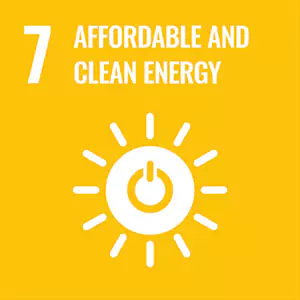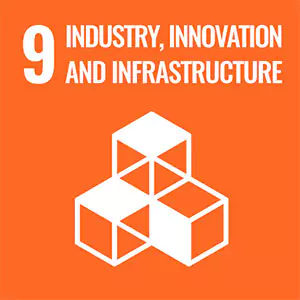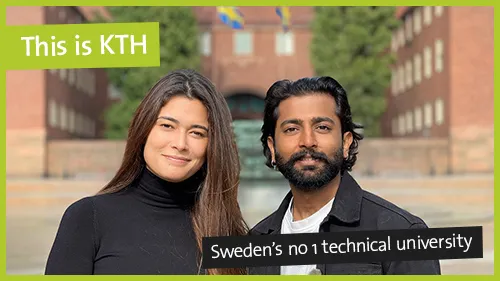MSc Engineering Materials Science
The master's programme in Engineering Materials Science has a cross-functional approach, exploring existing materials, processes and applications, and providing you the skills to develop new ones. It offers great flexibility to tailor your degree towards a profile of interest. Graduates have valuable expertise in materials science needed in many industries and sectors, for example, manufacturing, automotive and energy.

Engineering Materials Science at KTH
Engineering Materials Science is a broad and interdisciplinary field that studies the processes, structures, properties, and applications of materials. It has a long history that dates back to ancient times, but also a dynamic and evolving present driven by new discoveries and challenges. Metallic materials have the potential to revolutionise various domains such as energy, medicine, communication, transportation, and defence. Sweden has a strong tradition of Engineering Materials Science with breakthrough innovations in the field, such as fossil-free steel that seeks to eliminate CO2 emissions throughout the value chain from mining to steel production. Steel is, without a doubt, one of the most important materials in human society, and its uses range from low-tech to very high-tech applications. Due to its importance, a vast amount of research has been and continues to be produced within the field. As such, it is also an excellent "model material" from which we can understand other metallic materials. Materials science at KTH has a very high ranking among universities in the world. At the Department of Materials Science and Engineering, state-of-the-art research involving the processes, structures and properties of steel is being performed.
Through the programme in Engineering Materials Science, you will gain excellent knowledge of metallic materials' processes, structures and properties. Furthermore, you have great flexibility to tailor your studies towards your interests and ambitions when choosing elective courses. To make it easier, we have constructed a number of profiles in collaboration with industrial and academic partners that require specific knowledge in the Engineering Materials Science field. These profiles prepare you for a future career in production, research and development, management or academia.
Through the programme courses, you can further explore topics such as casting, metal forming, powder metallurgy (additive manufacturing), experimental methods, quantum metallurgy (ab initio), team leadership, project management, economical process analyses and product innovation, combustion in industrial processes, and energy and materials sustainability, corrosion and surface protection are all vital parts of the programme. The curriculum provides you with a comprehensive skillset and understanding of materials science, combined with technical depth and expertise in specific fields. Courses combine theoretical studies with laboratory work and industry projects, giving you hands-on experience with advanced materials testing equipment and experimental methods, depending on your selection of conditionally elective courses. The strong demand for materials scientists from Swedish metals industry contribute to many collaborative courses where the industry is providing real problems to solve.
This is a two-year programme (120 ECTS credits) given in English. Graduates are awarded the degree of Master of Science. The programme is given mainly at KTH Campus in Stockholm by the School of Industrial Engineering and Management (at KTH).
Courses in the programme
The courses in the programme cover topics such as process metallurgy, physical metallurgy, mechanical metallurgy, materials design, process design, thermodynamics, kinetics, experimental methods, and functional materials.
Courses in the programme Engineering Materials Science
Future and career
Graduates from the programme are in great demand in Stockholm and the rest of Sweden, Europe and the world. There are many job opportunities in sectors directly associated with metallurgy – such as iron, steel and other metal-producing industries (for example, powder metallurgy and hard metal). However, as a material specialist with outstanding knowledge about metals, you will find that your knowledge is of importance in the automotive industry, manufacturing industry, aerospace industry, companies in the energy sector, the public sector, the environmental sector or private enterprises. Graduates from the programme work at a huge selection of companies, such as Sandvik, SSAB, Outokumpu, Swerim and Scania, to name a few. The programme also provides a solid scientific foundation for further research studies at KTH or abroad after graduating.
Sustainable development
Graduates from KTH have the knowledge and tools for moving society in a more sustainable direction, as sustainable development is an integral part of all programmes. The three key sustainable development goals addressed by the master's programme in Engineering Materials Science are:



Affordable and Clean Energy: Access to energy is a prerequisite for achieving many of the sustainable development goals set by the UN. Materials play an essential role in meeting the strong demand for renewable energy, for example, engineering and functional materials for harvesting energy from the sun, wind and ocean waves. In the master’s programme in Engineering Materials Science, you can take courses to design materials for such applications.
Industry, Innovation and Infrastructure: The present and future challenges we face in achieving the UN sustainable development goals require all sectors transition to sustainable energy production. Industries must work with continuous improvements throughout their organisations and be willing to take risks to accelerate the transition to a more sustainable society. Achieving this relies on trained engineers in many fields, including materials science. The master’s programme in Engineering Materials Science prepares you for taking a leading role in change and research projects.
Climate Action: Climate change poses a clear and present danger for our planet. An important part of the actions against climate change is reducing CO2 emissions. When you take the master’s programme in Engineering Materials Science, you will learn about and meet researchers working in the HYBRIT project, which aims to enable fossil-free steel production.
Faculty and research
Materials science deals with the relationship between behaviour - properties - structure-production. Therefore, the research spans several areas of science such as quantum mechanics, solution chemistry, corrosion theory, the metallurgy of steel and other metals, foundry technology, ceramics, thermodynamics, reaction kinetics, energy, fracture mechanics and materials. The Department of Materials Science and Engineering coordinates the programme and contributes to the majority of the courses given.







